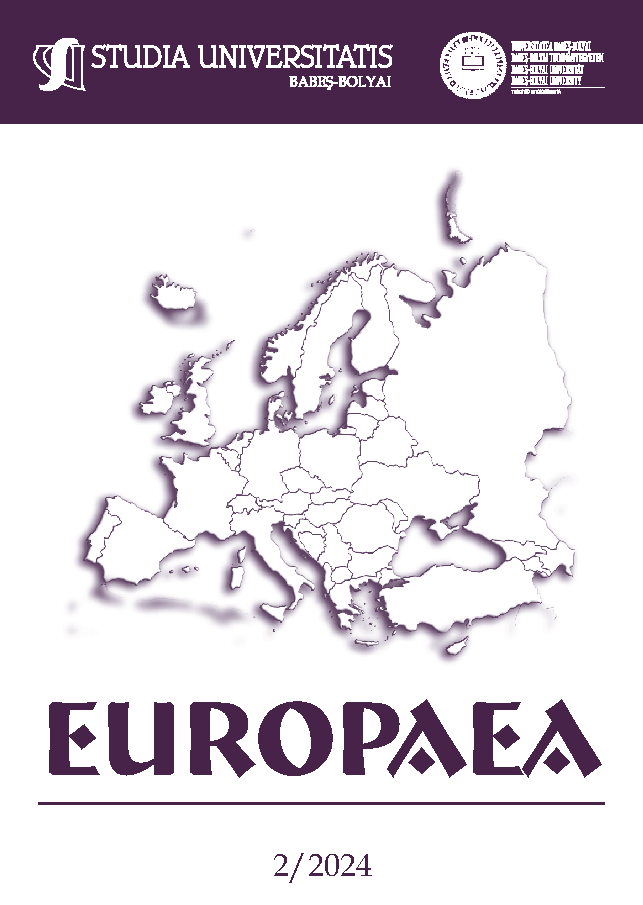BEYOND APOLOGIES: AN ANALYSIS OF KOREAN-JAPANESE FOREIGN RELATIONS THROUGH THE LENS OF THE COMFORT WOMEN ISSUE
DOI:
https://doi.org/10.24193/subbeuropaea.2024.2.03Keywords:
South Korea, Japan, Comfort Women, Historical Memory, DiplomacyAbstract
From Japan’s avoidance to South Korea’s collective memory of times of forced occupation, suppression, and abuse, historical memory is stagnant, all-absorbing, and never-fading. This paper focuses on delving into the Japan and South Korea dynamics, examining the intricate interplay of historical memory surrounding comfort women and its consequential impact on the political stability of the East Asian region. Utilizing diverse research methodologies, including policy analysis, legal examination, and content analysis, this paper builds on the work of experts Gi-Wook Shin, Soon-Won Park, Gap-Min Pyong, and Marc E. Caprio. Between apologies lacking sincerity, prominent international attention to the comfort women issue, and the memory burden on the Korean population, reconciliation never seems to be enough.
References
1. Brazinsky, Gregg A. (2022), “Achieving a More Durable Japan-South Korea Rapprochement, United States Institute of Peace”, United States Institute of Peace, [https://www.usip.org/publications/2022/09/achieving-more-durable-japan-south-korea-rapprochement], 19 May 2024.
2. Burgess, John; Lee, Young H., (1984), “Hirohito Says Role in Korea Was 'Unfortunate'”, The Washington Post, [https://www.washingtonpost.com/archive/politics/1984/09/07/hirohito-says-role-in-korea-was-unfortunate/70fa0e14-4656-452a-81a4-37edb095cf10/], 15 May 2024.
3. Caprio, Mark E., (2009), Japanese assimilation policies in colonial Korea, 1910–1945, Washington: University of Washington Press, 82-85.
4. Choi, Jae-hee, (2023) “When Koreans lost a first lady”, Korean Herald, [https://www.koreaherald.com/view.php?ud=20230322000738], 15 May 2024.
5. Colbert, Evelyn, (1986) “Japan and the Republic of Korea: Yesterday, Today, and Tomorrow,” Asian Survey 26, no. 3, 273–91.
6. Dahl, Tracy (1983), “Nakasone, in Seoul, Seeks to Strengthen Japan, U.S.-Korea Alliance”, The Washington Post, [https://www.washingtonpost.com/archive/politics/1983/01/12/nakasone-in-seoul-seeks-to-strengthen-japan-us-korea-alliance/38ab40cd-4960-44fc-8d51-fc6b103561cf/], 15 May 2024.
7. Hankyoreh, (2023), “Another death leaves only 9 surviving Korean ‘comfort women’ ”, [https://english.hani.co.kr/arti/english_edition/e_national/1090418.html], 19 May 2024.
8. Hosaka, Yuji (2021), “Why Did the 2015 Japan-Korea ‘Comfort Women’ Agreement Fall Apart?”, The Diplomat, [https://thediplomat.com/2021/11/why-did-the-2015-japan-korea-comfort-women-agreement-fall-apart/], 17 May 2024.
9. Kang, Hildi (2001) Under the Black Umbrella: Voices from Colonial Korea, 1910–1945, Ithaca: Cornell University Press, 111-122.
10. Kang, Hyunmin Michael (2018) “South Korea Decides to Dismantle ‘Comfort Women’ Reconciliation and Healing Foundation”, The Diplomat, 2018, [South Korea Decides to Dismantle ‘Comfort Women’ Reconciliation and Healing Foundation – The Diplomat], 19 May 2024.
11. Kim, Michael (2007), “The Aesthetics of Total Mobilisation,” in The Visual Culture of Late Colonial Korea. Totalitarian Movements and Political Religions, no. 3, 483–502.
12. Korea Center for Investigative Journalism, “Sorrowful Homecoming”, uploaded March 2016, video, [ENG SUB] Sorrowful Homecoming Part 1 - 'comfort women' victims by the Japanese army - YouTube], 14 May 2024.
13. Ku, Dae-Yeol (2021), Korea 1905–1945 From Japanese Colonialism to Liberation and Independence, United Kingdom: Renaissance Books, 39 – 41.
14. Lee, Joyce; Shin, Hyonhee (2017) “South Korea says 'comfort women' deal flawed, but Japan warns against change”, Reuters, [https://www.reuters.com/article/us-southkorea-japan-comfortwomen-idUSKBN1EM056/], 19 May 2024.
15. Lee, Sun-young (2023), “Kim Dae-jung kidnapping: How future Nobel laureate nearly fell victim to junta”, Korean Herald, [https://www.koreaherald.com/view.php?ud=20230315000794], 15 May 2024.
16. Lindsay, James M.; Shortridge, Anna, (2020) “TWE Remembers: The Taft-Katsura Memorandum”, Council on Foreign Affairs, [cfr.org/blog/twe-remembers-taft-katsura-memorandum-0], 10 May 2024.
17. Lone, Stewart (1991), “The Japanese Annexation of Korea 1910: The Failure of East Asian Co-Prosperity,” in Modern Asian Studies, 25, no. 1, 143-173.
18. Marconi, Rachele (2022), “Solidarity and Justice for War Crimes Against Women: The ‘Comfort Women’ Case” in the LSE Women, Peace and Security Working Paper Series, no. 28/2022, [https://www.lse.ac.uk/women-peace-security/assets/documents/2022/WPS28Marconi.pdf], 15 May 2024.
19. Panda, Ankit (2017), “The ‘Final and Irreversible’ 2015 Japan-South Korea Comfort Women Deal Unravels”, The Diplomat, [https://thediplomat.com/2017/01/the-final-and-irreversible-2015-japan-south-korea-comfort-women-deal-unravels/], 17 May 2024.
20. Park, Soon-Won (2007) “The politics of remembrance: The case of Korean forced labourers in the Second World War” in Editors: Shin, Gi-Wook; Park, Soon-Won and Yang, Daqing Rethinking Historical Injustice and Reconciliation in Northeast Asia: The Korean experience, New York: Routledge, 86-111.
21. Pyong, Gap-Min (2003), “Korean "Comfort Women": The Intersection of Colonial Power, Gender, and Class” in Gender and Society 17, no. 6, 938-957, [Korean "Comfort Women": The Intersection of Colonial Power, Gender, and Class on JSTOR], 12 May 2024.
22. Ramaj, Klea (2022) "The 2015 South Korean–Japanese Agreement on ‘Comfort Women’: A Critical Analysis", in International Criminal Law Review, 22, no. 3, 475-509.
23. Shim, David (2023), “Memorials’ politics: Exploring the material rhetoric of the Statue of Peace,” in Memory Studies, no. 4, 663-676.
24. Soh, Chunghee Sarah (1996), “The Korean ‘Comfort Women’: Movement for Redress” in Asian Survey, 36, no. 12, 1226–40.
25. The Asahi Shimbun (2023), “Yoon strives to avoid repeat of failed ‘comfort women’ accord”, [https://www.asahi.com/ajw/articles/14855612], 19 May 2024.
26. Treaty On Basic Relations Between Japan and The Republic Of Korea, No. 8471, Signed At Tokyo, on 22 June 1965, [https://treaties.un.org/doc/Publication/UNTS/Volume%20583/volume-583-I-8471-English.pdf], 14 May 2024.
27. UN General Assembly, Resolution 195 (III), titled "The problem of the independence of Korea", (1948), [https://digitallibrary.un.org/record/210026,] 14 May 2024.
28. United Nations Human Rights Office of the High Commissioner (2016), Committee on the Elimination of Discrimination Against Women examines reports of Japan, [https://www.ohchr.org/en/press-releases/2016/02/committee-elimination-discrimination-against-women-examines-reports-japan], 18 May 2024.
29. Yi, Tae-Jin (2016), “Treaties Leading to Japan’s Annexation of Korea: What Are the Problems?” in Korea Journal 56, no. 4, 5-32.
30. Yōko, Hayashi (1999) “Issues Surrounding the Wartime ‘Comfort Women’,” Review of Japanese Culture and Society 11/12, 54–65, [http://www.jstor.org/stable/42800182.], 12 May 2024.
Downloads
Published
How to Cite
Issue
Section
License
Copyright (c) 2024 Studia Universitatis Babeș-Bolyai Studia Europaea

This work is licensed under a Creative Commons Attribution-NonCommercial-NoDerivatives 4.0 International License.



